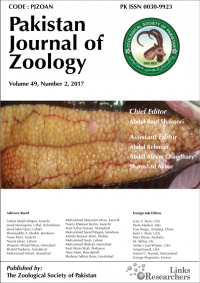Effect of Ration Level and Feeding Frequency on Growth, Nutrient Utilization and Body Composition of Juvenile Black Fin Sea Bream, Acanthopagrus berda (Forsskal 1775)
Effect of Ration Level and Feeding Frequency on Growth, Nutrient Utilization and Body Composition of Juvenile Black Fin Sea Bream, Acanthopagrus berda (Forsskal 1775)
Abdur Rahim1, Ghulam Abbas1*, Lorenzo Gallus2, Sara Ferrando2, Muhammad Hafeez-ur-Rehman3, Abdul Ghaffar4 and Abdul Mateen5
ABSTRACT
In this study, effect of different feeding level and frequency on growth performance, nutrient utilization and body composition of juvenile black fin sea bream, Acanthopagrus berda (weight 23.5g−125.8 g) were investigated. Fish were randomly distributed in rectangular glass tanks (150 liter) and were fed at six ration levels of 2.0, 2.5, 3.0,3.5, 4.0 and 4.5% body weight per day (BW d−1) and four feeding frequency i.e., once, twice, thrice and four times per day. Fish in all replicates were fed with diet comprising 40% protein and 20% lipid for 75 days. Higher percent weight gain (% WG), best feed conversion ratio (FCR) and specific growth rate (SGR) were recorded at ration level from 2.5 to 4.5% BW d−1 and feeding frequency of three to four times daily. The moisture, protein and ash contents of whole body of the fish were not significantly (P>0.05) affected by feeding frequency. The highest lipid contents were observed in fish at feeding frequency of three to four times daily. The condition factor (CF), viscerosomatic index (VSI) and hepatosomatic index (HSI) were significantly (P< 0.05) higher in fish at ration levels from 2.5 to 4.5% BW d−1 and feeding frequency of three to four times daily. These results concluded that the optimum ration level and feeding frequency of the juvenile sea bream A. berda (weight 23.5g to 125.8 g) are 2.5% BW d−1 and three times daily, respectively, under similar culture conditions.
To share on other social networks, click on any share button. What are these?









